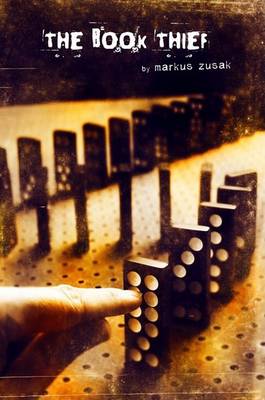JUST POSTED ON MY BLOG!
The Book Thief has been reviewed many times over. I bet everything that could be said about it, already has been. But... as a Jew, reading this book, I feel obligated to add in my two cents. So bear with me. This is going to be a very personal review. In fact, it's going to speak largely about things surrounding the book instead of the book itself.
Originally, I never intended to read the Book Thief.
As a general rule, I don't read Holocaust based novels. In Israel, we study the Holocaust extensively (in relations to Jews mostly, for obvious reasons) from the first grade to the twelfth. We annually mention and mourn the 6 million lost on a special day. We have school trips to the Holocaust Museum. We do papers and projects on the subject every year. We have lectures with survivors.
And, honestly, every damn holocaust book I read brings me to a sobbing mess, and I don't enjoy that.
I always tell my grandma, who made it her mission to read as many of those testimonies as possible, that one day, I'll probably start seeking those stories, but right now, I am too overcome by the darkness that engulfs me when I read of it.
So, again, I wasn't planning on reading this in the near future. But then the movie was coming out, and the book was on sale, and I found out Death was narrating the story, and that it's about a young German girl in the holocaust and I became curious. So I started it.
I was almost immediately disappointed. I did not like the narration, even though it was the thing I was most looking forward to. Death's voice felt a bit choppy to me, and I did not like how he felt the need to end every chapter (or what felt like) on these ambiguous notes. It took a long while to get used to It's voice.
I was feeling very dejected (even though I was loving Lisel and her Papa), when Max came into the picture. And from that moment on, I was hooked. I didn't know (and maybe I should've) that this book tells the story of what we call khassidey umot ha-olam, and in English is apparently referred to as: "Righteous Among the Nations".
I've always loved those stories. The stories that show there were people who resisted the brainwashing; resisted the propaganda; kept their humanity intact; saw through the veil over their eyes. That's what has always been the hardest to swallow, for me; how people were able to boycott and humiliate and demean people who have been their neighbors, their friends, their partners. And yet it happened, on a massive scale.
Hans Hubermann did not forget his friends, though. He wasn't fooled. I loved that. I loved Max. I loved the relationships that bloomed between the Hubermanns and Max. I loved everything that had to do with that.
And, I'll admit, I loved reading of the Holocaust from a different perspective. Not from the direct victims, but from the eyes of a little German girl. How her life was affected by it all. What the war did to her. To them.
Like death, I still pity those in the concentration camps a lot more than the Germans. I still pity the families broken or obliterated far more. I can't deny that--nor do I feel the need to. But this story was still powerful, andserved to show everyone gets hurt in a war.
And, yes, I admit it: I cried. I was quietly sobbing in my room from part ten on. It was heartbreaking. In a different way than most of the holocaust books I've read before, but not any less powerful.
(BTW, anyone else shipping Max and Lisel despite the ten-year age gap?)
And, I'll admit, I loved reading of the Holocaust from a different perspective. Not from the direct victims, but from the eyes of a little German girl. How her life was affected by it all. What the war did to her. To them.
Like death, I still pity those in the concentration camps a lot more than the Germans. I still pity the families broken or obliterated far more. I can't deny that--nor do I feel the need to. But this story was still powerful, andserved to show everyone gets hurt in a war.
And, yes, I admit it: I cried. I was quietly sobbing in my room from part ten on. It was heartbreaking. In a different way than most of the holocaust books I've read before, but not any less powerful.
(BTW, anyone else shipping Max and Lisel despite the ten-year age gap?)

